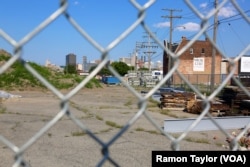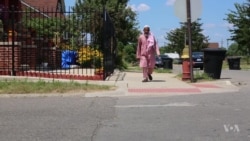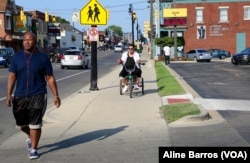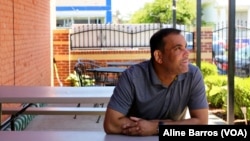Beside rows of rusting shipping containers, a decorative wrought iron fence surrounds Taquería Mi Pueblo, one of the first family-run Mexican restaurants in southwest Detroit, Michigan.
Its owner, Jalisco-native José de Jesús López, surveys the trees he planted and his ornamental roosters.
“Everything was abandoned, a dump over there,” he said, walking down Dix Street. When he first arrived as an undocumented immigrant in 1981, López recalls a drug-addict-infested lot and overrun lawn.
“Mexicantown,” as the area is affectionately and marketably called today, is one of Metro Detroit’s most vibrant dining scenes for locals and tourists — and a model for other immigrant neighborhoods.
Landing destination
Like López, many foreigners stumbled upon Detroit, viewing the city as an economically viable “second landing destination” — friendly to immigrants, but with cheaper housing and commercial space than traditional immigrant hubs like New York and San Francisco.
Through the 2008 recession and recovery, native-born residents fled. But immigrants kept coming, starting new businesses, hiring local residents and making their neighborhoods a safer place for children.
A June study by Global Detroit and New American Economy reveals that the city’s immigrant population grew by 12.1 percent between 2010 and 2014, at a time when the city’s overall population declined by 4.2 percent. Though the four-year increase in immigrants amounts to merely 4,137 individuals, the study claims the effects have been widely felt.
Watch: Beleaguered Detroit Relying on Immigrants to Revitalize City
“Immigrants are leading in the city’s recovery,” said Steve Tobocman, director of Global Detroit, “particularly in its neighborhoods like Mexicantown, in Banglatown, where new residents are moving in and helping to stabilize working-class communities by fixing up homes, opening up businesses, and creating more consumers.”
Depopulation, Tobocman adds, remains Detroit’s biggest challenge moving forward, while immigrants are “our best hope to rebuilding,” especially on the neighborhood level.
No ‘magic bullet’
According to Americas Society/Council of the Americas (AS/COA) and Fiscal Policy Institute, more than one-third of Detroit-area “Main Street” business owners were immigrants as of 2013.
But data measuring their economic contributions can be misleading, says Stanley Renshon, CUNY professor of political science.
“Any economic activity is grabbed by economists as positive,” Renshon told VOA. “Yes, you increase the overall financial numbers of the country, but the people who benefit most from that are the immigrants themselves, and that’s fine. We want them to prosper, but don’t tell me that what you’re doing is saving the country or the city or the town.”
Detroit’s ongoing struggles, including a long history of political corruption and one of the highest murder rates in the country, can’t be solved by new immigrants, he added.
Hurting American workers?
Last week, White House senior adviser for policy Stephen Miller announced the administration’s support for an immigration bill that would cut legal immigration by half.
Their premise that less-skilled immigrants take away work opportunities from native-born Americans is an “America first” message intended to resonate with President Donald Trump’s base in depressed rust belt towns like Detroit.
“How is it fair, or right or proper that if, say, you open up a new business in Detroit, that the unemployed workers of Detroit are going to have to compete against an endless flow of unskilled workers for the exact same jobs?” asked Miller during a White House press briefing Aug. 2.
Global Detroit’s Tobocman says Trump’s proposed policies won’t produce any new jobs and may cost the Michigan economy hundreds of millions of dollars.
“[Trump’s actions would choke] off a critical supply of talent, of investment, and of global connections that are critical to the future of Michigan, to us being a mobility capital for the world,” Tobocman said.
Detroit suffered an unemployment rate of 28.4 percent during the great recession, but had rebounded to 7.8 percent in June.
Banglatown
Following the likes of Mexicantown, Metro Detroit’s second-most populous foreign-born community, from Bangladesh, hopes to follow suit and create a cultural tourist destination of its own: Banglatown.
“You will hardly find any vacant spot right now,” said Ehsan Taqbeem, founder of Bangladeshi-American Public Affairs Committee (BAPAC), driving his Jeep Grand Cherokee past South Asian restaurants, fabric and fish shops in Detroit and neighboring Hamtramck.
“The value of the homes have gone up since [the recession], businesses have been thriving, and traffic has gone up tremendously,” he said.
Unlike Mexicantown, Banglatown is a concept still in its early stages. There are no traditional rickshaws carrying tourists down Conant Avenue — at least not yet.
But Taqbeem, who runs an automotive retrofitting service, along with other local business owners, sees the benefit of being a branded community in a global-minded city.
Mahabub Chowdhury, part-owner of Aladdin Sweets & Cafe, found success in nourishing his neighborhood and patrons, a majority of whom are non-Bangladeshis. One regular customer, whom he describes as a nice “American white person,” calls him directly.
“Sometimes his car is broken, and he calls us, ‘Can you pick me up from my house?’ And we go to his house and bring him to our restaurant,” Chowdhury said.
‘Believing in Detroit’
In Mexicantown, Lopez’s eyes well as he recalls his early days on a Jalisco ranch, before finding eventual success in Detroit.
“My main dream was to be able to buy a truck for my dad,” Lopez said. “I worked all my life, and when I had the money, I didn’t have my father anymore.”
Now an American citizen, López, a father of four, says he accomplished the American Dream by creating something that will outlive him and provide for the community long after he has passed.
What Detroit still needs, he said, is more people to call it home.
“That’s happening little by little,” Lopez said. “The greatest changes won’t happen overnight.”
“They happen slowly, and that’s part of believing in oneself, believing in Detroit,” he said.












